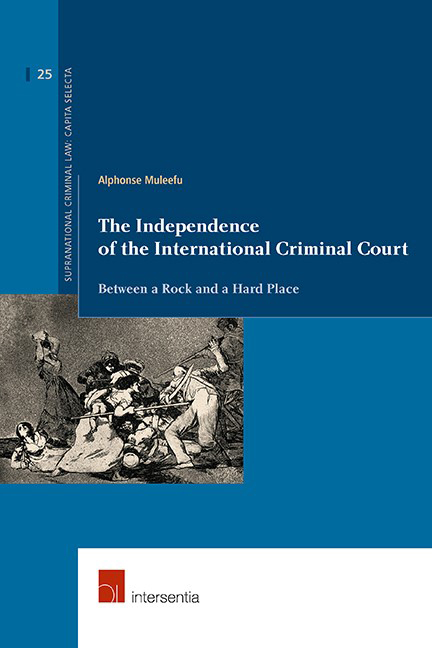Book contents
- Frontmatter
- Book part
- Dedication
- Preface
- Contents
- List of Abbreviations
- Chapter 1 General Introduction and Some Points of Departure
- Chapter 2 Competing Narratives about the ICC
- Chapter 3 The ICC Prosecutor's Decision-Making Process
- Chapter 4 Between Independence and Pragmatism
- Chapter 5 Concluding Remarks
- Bibliography
- Index
- About the Author
Chapter 5 - Concluding Remarks
Published online by Cambridge University Press: 15 November 2019
- Frontmatter
- Book part
- Dedication
- Preface
- Contents
- List of Abbreviations
- Chapter 1 General Introduction and Some Points of Departure
- Chapter 2 Competing Narratives about the ICC
- Chapter 3 The ICC Prosecutor's Decision-Making Process
- Chapter 4 Between Independence and Pragmatism
- Chapter 5 Concluding Remarks
- Bibliography
- Index
- About the Author
Summary
It is fair to state that the Court's institutional independence is well preserved in the Rome Statute and the Court's staff members are capable of making independent decisions. It is the inbuilt cooperation and interactions with actors of different interests that is problematic. The two competing narratives about the International Criminal Court (ICC) are both to a certain extent intelligibly persuasive. The oddity of this reality becomes more evident when each narrative is taken separately, but when the two are put together, one starts to realise that there are some unsaid truths, inconsistences, exaggerations and misinformation on both sides. These nuances, I argue, demonstrate a possibility of bridging the gap between these two competing arguers if there were goodwill on both sides – to achieve the common good of fighting impunity. Another challenge is that both sides lack a single representative authority and/or a common position on all issues of concern. On the side of supporters, there are some issues that are within the powers of the United Nations Security Council (UNSC), there are those that concern the Assembly of States Parties (ASP), others are at the Office of the Prosecutor (OTP), and there is the Coalition for the ICC that is influencing all actors. On the side of critics, the African states are neither a unified block nor consistent in terms of their rhetoric and conduct. They seem not to have a coherent and shared solution to improve the ICC-Africa relationship, and since the proposed regional criminal court (African solutions to African problems) has not taken off, Africa lacks a viable alternative that would work as a strong stance against impunity.
This could be a good opportunity for the Court to engage with all stakeholders considering their diverse backgrounds and perspectives. It needs to find ways of listening to both critics and supporters. This is possible if the Court is willing to acknowledge that each side of the debate has some legitimate objectives. Whereas the critics of the Court seem to be focused on fighting the existing global power imbalances that have disenfranchised Africa for so long, supporters of the Court are motivated by their belief in developing international norms.
- Type
- Chapter
- Information
- The Independence of the International Criminal CourtBetween a Rock and a Hard Place, pp. 101 - 114Publisher: IntersentiaPrint publication year: 2019



